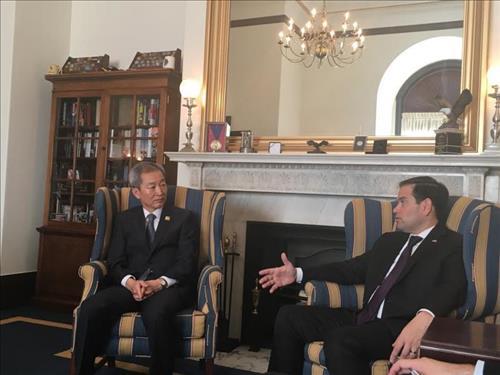- California Assembly OKs highest minimum wage in nation
- S. Korea unveils first graphic cigarette warnings
- US joins with South Korea, Japan in bid to deter North Korea
- LPGA golfer Chun In-gee finally back in action
- S. Korea won’t be top seed in final World Cup qualification round
- US men’s soccer misses 2nd straight Olympics
- US back on track in qualifying with 4-0 win over Guatemala
- High-intensity workout injuries spawn cottage industry
- CDC expands range of Zika mosquitoes into parts of Northeast
- Who knew? ‘The Walking Dead’ is helping families connect
Rubio ‘wholeheartedly’ rejects claims against Korea-U.S. FTA
WASHINGTON, July 1 (Yonhap) — Former U.S. presidential candidate Sen. Marco Rubio said Friday that he “wholeheartedly” rejects claims that the free trade agreement with South Korea brought no benefits to the U.S.
Rubio (R-FL) made the remark in a statement on his meeting Thursday with South Korean Ambassador Ahn Ho-young, just days after Republican presidential presumptive nominee Donald Trump stepped up attacks on free trade deals, including the one with South Korea.
“I wholeheartedly reject the claims of those who try to argue that the U.S.-Korean alliance has not benefited America strategically and economically,” Rubio said in the statement.
Calling South Korea a “key U.S. ally,” Rubio said that continued peace and prosperity in Asia hinges on a “continued deepening of our security and economic ties.”

South Korean Ambassador Ahn Ho-young (L) holds talks with Sen. Marco Rubio in Washington on June 30. (Courtesy of the office of U.S. Senator Marco Rubio)
In a speech Tuesday, Trump claimed the free trade deal with South Korea enlarged U.S. trade deficits and cost American jobs, calling it “a job-killing deal.”
Trump also vowed to pull out of the 12-nation Trans Pacific Partnership if elected president. He also said he would immediately renegotiate the North American Free Trade Agreement to get a better deal, and withdraw from the deal unless Canada and Mexico agree to a renegotiation.
The address reinforced concern that the real-estate tycoon could also seek a renegotiation of the deal with Korea, even though he made no mention of the possibility.
The pact, which went into effect in 2012, has been viewed as an economic alliance between the two countries.
“Our state enjoys strong trade links with South Korea that have only deepened in recent years. I reiterated my commitment to the U.S.-Korea alliance, and we discussed how we can continue working closely together to deal with regional challenges, especially the threat posed by North Korea,” Rubio said of the meeting with the Korean envoy.
The senator also said that he expressed thanks for South Korea’s cooperation in “making sure that Florida’s citrus farmers continue to enjoy the benefits of the U.S.-South Korea free trade agreement.”
He said the trade deal has been “hugely beneficial to Florida companies and communities.”











